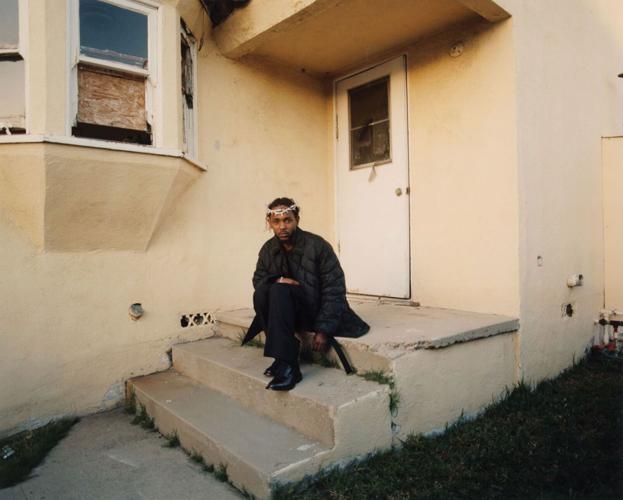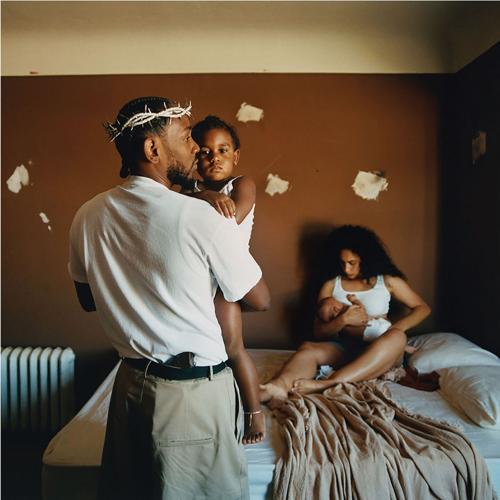
Mr. Morale and the Big Steppers is possibly Kendrick Lamar’s most personal album, and his most challenging. As suggested by the album art — depicting Lamar with a crown of thorns holding one of his children, a gun tucked into his waistband, and his fiancée and another of their children in the background — there is a struggle between worldliness and salvation, between violence and sainthood, between his childhood in Compton and the life of fatherhood ahead of him. It’s hard not to imagine it’s also a tribute to his hero Tupac, who was rendered as Christ on the cross on the cover of 1996’s posthumously released The Don Killuminati.
While there is a messianic aspect to K.Dot’s presentation of himself on this album, his spiritual journey is as much about family as it is about God: Ascension and salvation are about overcoming generations of trauma. And while Kendrick is out to exorcise his own demons, he’s also baring the sins and scars of those close to him in a public act of redemption and absolution.
He’s open about seeking therapy — with Oprah-endorsed self-help author Eckhart Tolle voicing a psychologist at various points in the LP. The rapper, known for avoiding drugs and alcohol, admits to a sex addiction. He broaches the topic of his infidelity on intro track “United in Grief” and again in “Worldwide Steppers,” linking it to feelings of insecurity and grappling with newfound fame.
But he really brings the theme together on the expansive “Mother I Sober,” a song near the end of the album. It’s a generations-spanning story of how his mother was sexually abused, and how that revelation rocked Lamar — and how similar legacies of trauma haunt Black families. He’s open about the strain it caused on their relationship, but sets out to end it. Sometimes Lamar is content to let bleak songs have bleak endings, followed by a more hopeful track. Here, he closes out on a note of victory, rapping that he confronted his addiction, with his fiancée telling his children on the track that he ended a generational curse.
There are also moments of levity. Lamar has always had a knack for bringing bars and hooks to heavy themes. “Father Time” reflects on how his father’s tough — even callous — parenting shaped him into someone who, though closed off to softer emotions, was still “not as mature as [he] thought.” But Lamar balances it with a bittersweet, catchy hook by Sampha, recalling his similar balancing act in 2012’s dark yet radio-friendly jam “Swimming Pools (Drank).”

In the end, Lamar can only save his family. In “Savior,” he stresses he can’t be the same figure for his fans, and rejects the task, adding that other celebrities aren’t saviors either. He shares how his COVID-19 infection made him question NBA star Kyrie Irving’s refusal to get a shot as one example.
The track can be scolding at times — Lamar is frustrated at people who say they are pro-Black but criticize stars like Kodak Black, who also drops rhymes on the track “Silent Hill.” Black pleaded guilty to assaulting a teenage girl and later received a pardon on federal firearms charges from Donald Trump. Does Kendrick’s complaint hold water, especially on an album that tries to confront the legacy of abusive relationships?
Kodak Black’s presence may be frustrating to those who’d like to see less-muddled messaging on an album about trauma. But it emphasizes the point of “Savior”: We look to celebrities for guidance, but when difficult times hit home, we’re on our own. Contradictions and juxtapositions are scattered throughout the album to mixed effect.
Those contradictions have led to some controversy for the track “Auntie Diaries.” The song is a call for trans acceptance, featuring scenes of Kendrick confronting family and his pastor in defense of his trans relative — and make no mistake, that’s a huge deal coming from one of the most successful and acclaimed rappers of our time. But the track also features deadnaming and anti-gay slurs. There’s plenty of online debate about whether the transgression adds authenticity to the song (and how clumsily cis people navigate a loved one’s transition) or mars the loving message. Still, the display of allyship coming from the typically macho, homophobic mainstream rap makes it an important moment, if imperfect.
Exploring the politics of rappers is often a deep dive into murky messaging: We’re seeing writers revisiting the shortcomings of so-called conscious rap from the late ’90s and early Aughts, and the late, great Greg Tate noted early on that being a Public Enemy fan meant recognizing they were both brilliant agitprop artists and suckers for flirting with Farrakhan, antisemitism and misogyny.
Arguably Lamar isn’t exactly a conscious or political rapper — he’s a mainstream artist who doesn’t shy from messaging. And the politics of Mr. Morale seem to originate from a more personal point of view than his opus To Pimp a Butterfly, which felt like an ambitious effort to make sense of the troubled landscape that inspired the early Black Lives Matter movement. In a way, this album does capture the daze of the post-lockdown era, in which people are trying to reenter the world after being alone with their thoughts for so long. But the details of those internal journeys are different for everyone.
At the end of the day, Kendrick doesn’t feel like he owes you the moral clarity you want or need. And you shouldn’t bother him for any answers to your questions. He’s got his own shit to handle.






